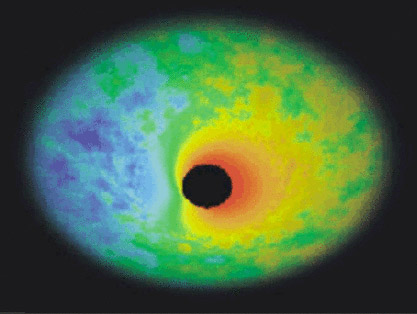RESEARCH METHODOLOGY -3
In our research we expect the unexpected

Simulated image of the accretion disk around a black hole: space & time distortions by the intense gravity shift emissions to longer & shorter wavelengths (NASA)
Furthermore, important breakthroughs in science often lie in the grey area between current orthodoxy and current heresy. For example, the idea that an asteroidal impact could have been involved in the extinction of the dinosaurs, or that the development of life happened in a jerky manner, were both heresy just a few decades ago.
At Genesis therefore, we tread a fine line in our research by working so as to expect the unexpected, and by being willing to actively resist the priority of the paradigm should the evidence prove powerful enough.
< Research Methodology (part 2) Educational Methodology (part 1) >


